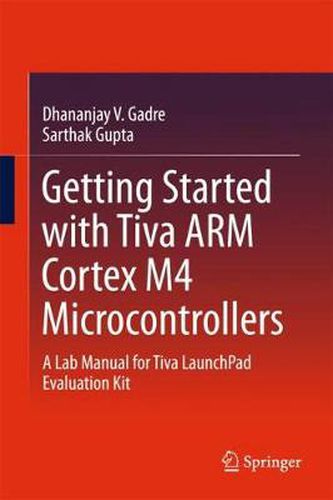Readings Newsletter
Become a Readings Member to make your shopping experience even easier.
Sign in or sign up for free!
You’re not far away from qualifying for FREE standard shipping within Australia
You’ve qualified for FREE standard shipping within Australia
The cart is loading…






This title is printed to order. This book may have been self-published. If so, we cannot guarantee the quality of the content. In the main most books will have gone through the editing process however some may not. We therefore suggest that you be aware of this before ordering this book. If in doubt check either the author or publisher’s details as we are unable to accept any returns unless they are faulty. Please contact us if you have any questions.
The book presents laboratory experiments concerning ARM microcontrollers, and discusses the architecture of the Tiva Cortex-M4 ARM microcontrollers from Texas Instruments, describing various ways of programming them. Given the meager peripherals and sensors available on the kit, the authors describe the design of Padma - a circuit board with a large set of peripherals and sensors that connects to the Tiva Launchpad and exploits the Tiva microcontroller family’s on-chip features. ARM microcontrollers, which are classified as 32-bit devices, are currently the most popular of all microcontrollers. They cover a wide range of applications that extend from traditional 8-bit devices to 32-bit devices. Of the various ARM subfamilies, Cortex-M4 is a middle-level microcontroller that lends itself well to data acquisition and control as well as digital signal manipulation applications. Given the prominence of ARM microcontrollers, it is important that they should be incorporated in academic curriculums. However, there is a lack of up-to-date teaching material - textbooks and comprehensive laboratory manuals. In this book each of the microcontroller’s resources - digital input and output, timers and counters, serial communication channels, analog-to-digital conversion, interrupt structure and power management features - are addressed in a set of more than 70 experiments to help teach a full semester course on these microcontrollers. Beyond these physical interfacing exercises, it describes an inexpensive BoB (break out board) that allows students to learn how to design and build standalone projects, as well a number of illustrative projects.
$9.00 standard shipping within Australia
FREE standard shipping within Australia for orders over $100.00
Express & International shipping calculated at checkout
This title is printed to order. This book may have been self-published. If so, we cannot guarantee the quality of the content. In the main most books will have gone through the editing process however some may not. We therefore suggest that you be aware of this before ordering this book. If in doubt check either the author or publisher’s details as we are unable to accept any returns unless they are faulty. Please contact us if you have any questions.
The book presents laboratory experiments concerning ARM microcontrollers, and discusses the architecture of the Tiva Cortex-M4 ARM microcontrollers from Texas Instruments, describing various ways of programming them. Given the meager peripherals and sensors available on the kit, the authors describe the design of Padma - a circuit board with a large set of peripherals and sensors that connects to the Tiva Launchpad and exploits the Tiva microcontroller family’s on-chip features. ARM microcontrollers, which are classified as 32-bit devices, are currently the most popular of all microcontrollers. They cover a wide range of applications that extend from traditional 8-bit devices to 32-bit devices. Of the various ARM subfamilies, Cortex-M4 is a middle-level microcontroller that lends itself well to data acquisition and control as well as digital signal manipulation applications. Given the prominence of ARM microcontrollers, it is important that they should be incorporated in academic curriculums. However, there is a lack of up-to-date teaching material - textbooks and comprehensive laboratory manuals. In this book each of the microcontroller’s resources - digital input and output, timers and counters, serial communication channels, analog-to-digital conversion, interrupt structure and power management features - are addressed in a set of more than 70 experiments to help teach a full semester course on these microcontrollers. Beyond these physical interfacing exercises, it describes an inexpensive BoB (break out board) that allows students to learn how to design and build standalone projects, as well a number of illustrative projects.